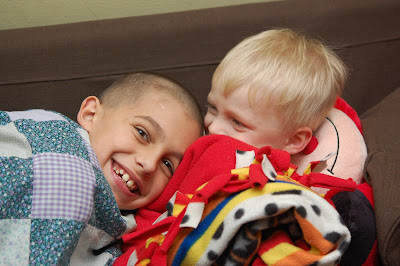The past couple of weeks, we have seen major movement forward in some of the stickiest growth areas for both Charlie and Ellis. As I write this, we have reached day 5 of Charlie wearing underwear without a single accident. We're about six months past my original potty training deadline, mainly because I lost focus during my nasty extended bout of morning sickness, but I will be able to keep my commitment to having only one child in diapers when the baby arrives in April.
He's happy as a clam with his new "big boy" status of using the toilet despite all my worries that he would resist forever. He originally wasn't sold on the idea at all, and while he liked his sticker chart and occasional candy awards, he still preferred to go in his pull-up if I didn't make him sit on the toilet periodically. On Sunday, Josh and I decided to take away his pull-up crutch, put some underwear on him, and deal with the accidents. There was a gigantic sob-fest about this transition, but after the crying and a couple of leaks, he sort of sighed and decided to make the most of the potty as if it was his idea in the first place.
This week also marked the third week in a row that Ellis has remembered to bring home his homework every night of the week. The forgetting started when he was struggling with multiplication tables as a way of avoiding an unpleasant task, but became a bad habit. We have a rule at our house that once you take care of all your responsibilities on a weeknight, you can do whatever you want with your free time until it's time to go to bed. Ellis's love of unstructured free time rivals my own, and when he found out that unstructured time disappeared if he didn't bring home his homework, it became a great motivator for him. Now he runs into the house immediately after school to finish his work to maximize his free time.
It took just the right mix of positive and negative reinforcement to facilitate these developments from a parental perspective, and it caused me to reflect on the most effective strategies for facing the growth areas we encounter regardless of our age. It's very easy to lose hope when struggling with things that don't come naturally to us. As adults, I think we too easily pathologize ourselves and give into the unhelpful negative that there's something wrong with us. The gratification for this negative is that we can use it as an excuse to avoid the work we need to do or to give up our power to achieve greater health, wisdom and happiness.
I prefer the asset-based philosophy that development continues long past childhood. We all have a deep well of strengths and assets that include the ability to surmount our personal obstacles and grow in ways that make us better. The primary work of our lives is to continue to identify and address our growth areas while maintaining the belief that it is possible and insisting that it will happen.









